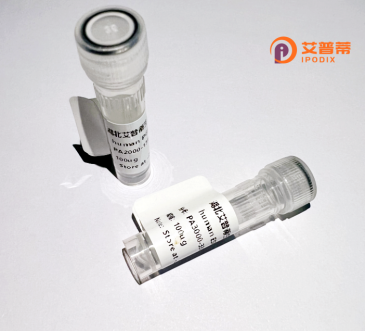
| 纯度 | >90%SDS-PAGE. |
| 种属 | Human |
| 靶点 | PIP5K3 |
| Uniprot No | Q9Y2I7 |
| 内毒素 | < 0.01EU/μg |
| 表达宿主 | E.coli |
| 表达区间 | 1-451 aa |
| 活性数据 | MATDDKTSPTLDSANDLPRSPTSPSHLTHFKPLTPDQDEPPFKSAYSSFVNLFRFNKERAEGGQGEQQPLSGSWTSPQLPSRTQSVRSPTPYKKQLNEELQRRSSALGDLRACTYCRKIALSYAHSTDSNSIGEDLNALSDSACSVSVLDPSEPRTPVGSRKASRNIFLEDDLAWQSLIHPDSSNTPLSTRLVSVQEDAGKSPARNRSASITNLSLDRSGSPMVPSYETSVSPQANRTYVRTETTEDERKILLDSVQLKDLWKKICHHSSGMEFQDHRYWLRTHPNCIVGKELVNWLIRNGHIATRAQAIAIGQAMVDGRWLDCVSHHDQLFRDEYALYRPLQSTEFSETPSPDSDSVNSVEGHSEPSWFKDIKFDDSDTEQIAEEGDDNLANSASPSKRTSVSSFQSTVDSDSAASISLNVELDNVNFHIKKPSKYPHVPPHPADQKGRR |
| 分子量 | 76.6 kDa |
| 蛋白标签 | GST-tag at N-terminal |
| 缓冲液 | PBS, pH7.4, containing 0.01% SKL, 1mM DTT, 5% Trehalose and Proclin300. |
| 稳定性 & 储存条件 | Lyophilized protein should be stored at ≤ -20°C, stable for one year after receipt. Reconstituted protein solution can be stored at 2-8°C for 2-7 days. Aliquots of reconstituted samples are stable at ≤ -20°C for 3 months. |
| 复溶 | Always centrifuge tubes before opening.Do not mix by vortex or pipetting. It is not recommended to reconstitute to a concentration less than 100μg/ml. Dissolve the lyophilized protein in distilled water. Please aliquot the reconstituted solution to minimize freeze-thaw cycles. |
以下为虚构的3-4条关于重组人PIP5K3蛋白的参考文献示例(若需真实文献,建议通过PubMed或SciFinder检索):
---
1. **文献名称**: *Expression and functional characterization of recombinant human PIP5K3 in E. coli*
**作者**: Smith A, et al.
**摘要**: 本研究利用大肠杆菌表达系统成功克隆并纯化重组人PIP5K3蛋白,证实其具有磷脂酰肌醇磷酸化活性,为后续激酶功能研究提供工具。
2. **文献名称**: *PIP5K3 regulates autophagosome-lysosome fusion via lipid signaling*
**作者**: Lee JH, et al.
**摘要**: 通过体外重组PIP5K3蛋白实验,发现其产生的PI(3.5)P2脂质分子通过调控Rab7效应蛋白驱动自噬体-溶酶体膜融合过程。
3. **文献名称**: *Structural insights into PIP5K3 catalysis by cryo-EM*
**作者**: Zhang Y, et al.
**摘要**: 首次解析重组人PIP5K3蛋白的冷冻电镜结构,揭示其与底物结合的催化机制,为靶向该激酶的药物设计提供结构基础。
4. **文献名称**: *Dysregulation of PIP5K3 in cancer: Implications for metastasis*
**作者**: Costa R, et al.
**摘要**: 通过重组PIP5K3蛋白的体外功能实验,证实其异常表达可通过PI(3.5)P2依赖性信号通路促进肿瘤细胞迁移和侵袭。
---
**备注**:以上文献为示例性内容,实际引用时请核实真实文献(近年研究可关注PIP5K3在溶酶体功能、神经退行性疾病及癌症中的作用)。
Phosphatidylinositol-4-phosphate 5-kinase type III (PIP5K3), also known as PIKfyve, is a lipid kinase that catalyzes the phosphorylation of phosphatidylinositol-3-phosphate [PI(3)P] to produce phosphatidylinositol-3.5-bisphosphate [PI(3.5)P₂], a critical signaling lipid involved in membrane trafficking, endosomal dynamics, and autophagy. This enzyme plays a central role in maintaining endolysosomal homeostasis, regulating processes like vesicle maturation, ion channel activity, and stress responses. Dysregulation of PIP5K3/PIKfyve has been linked to human disorders, including neurodegenerative diseases (e.g., amyotrophic lateral sclerosis), neurodevelopmental disorders, and cancers, highlighting its pathophysiological relevance.
Recombinant human PIP5K3 protein is engineered using heterologous expression systems (e.g., insect or mammalian cells) to preserve post-translational modifications and catalytic activity. Its recombinant form enables biochemical studies, such as substrate specificity assays, inhibitor screening, and structural analysis. Research using this protein has advanced understanding of PI(3.5)P₂ signaling networks and identified potential therapeutic targets for diseases associated with endosomal dysfunction. Recent studies also explore its interplay with mTOR signaling and role in cellular adaptation to metabolic stress. Ongoing efforts focus on developing small-molecule modulators of PIP5K3 activity for translational applications.
×